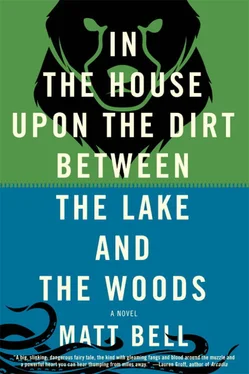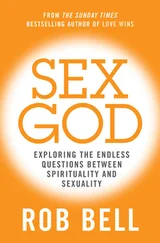Matt Bell
IN THE HOUSE UPON THE DIRT BETWEEN THE LAKE AND THE WOODS
In memory of John Schantz, uncle and friend and teacher
It seems likely that there are but two and that these beget no offspring, for I believe it is always the same ones that appear.
—THE KING’S MIRROR TRANSLATED BY LAURENCE MARCELLUS LARSON
1

BEFORE OUR FIRST ENCOUNTER WITHthe bear I had already finished building the house, or nearly so.
In the hasty days that followed, I feared we moved in too fast and too early, the house’s furnishings still incomplete, the doors not all right-hinged—and in response to my worries my wife said that was no trouble, that she could quickly finish what I had mostly made.
Beneath the unscrolling story of new sun and stars and then-lonely moon, she began to sing some new possessions into the interior of our house, and between the lake and the woods I heard her songs become something stronger than ever before. I returned to the woods to cut more lumber, so that I too might add to our household, might craft for her a crib and a bassinet, a table for changing diapers, all the other furnishings she desired. We labored together, and soon our task seemed complete, our house readied for what dreams we shared—the dream I had given her, of family, of husband and wife, father and mother, child and child—and when the earliest signs of my wife’s first pregnancy came they were attended with joy and celebration.
THE DIRT’S WETTEST SEASON SWELLED, and then its hottest burst the world to bloom, and through those tumid months my wife swelled too, expanded in both belly and breast until the leaves fell—and afterward came no more growth, only some stalling of the flesh gathering within her. Even before it was obvious that there would be no baby, even then my wife began to cry, to sing sadder songs that dimmed our already-fuel-poor gas-lamps, or cracked cups and bowls behind cupboard doors.
I angered that we would have to start again, and if my wife was not to birth some son then I wished only for that pregnancy’s speedy end, so that she might not suffer overlong, so that another child might be put in this one’s place. But still her body delayed, pretending that the bundle inside her might grow into some child, and my wife pretended too, and when I could not stand her insistence I again went out back of the house to where my wife had planted a garden, some few tubers and herbs to supplement what fish I took daily from the lake.
Now in my frustration I returned that place to the dirt it had been, and later my wife confronted me with what I had done. Her anger flushed her face, and her yelling contained none of the music I loved in her singing voice, and as she exhausted her still-round shape of its rage then at last I saw her labor was upon us.
What sad and sorry shape was born from her after those next days, that labor made long despite the lack of life within:
Not an arm, but an arm bud. Not a leg, but a leg bud, a proto-knee.
Not a heart but a heart bulge.
Not an eye but an eye spot, half covered by a translucent lid, uselessly clear.
Not a baby, instead only this miscarriage, this finger’s length of intended and aborted future.
And what was not born: No proper umbilical cord snaked from mother to baby, from placenta to belly, and so the starved child passed from my wife’s body into a clot of blood and bedsheet, and then into my waiting hand, where I lifted it before my eyes to look upon its wronged shape, that first terminus of my want.
Then to my lips, as if for a single kiss, hello and goodbye.
Then no kiss at all, but something else, some compulsion that even then I knew was wrong but could not help, so strong was my sadness, so sudden my desire: Into my body I partook what my wife’s had rejected, and while she buried her face in the red ruin of our blankets I swallowed it whole—its ghost and its flesh small enough to have in my fist like an extra finger, to fit into my mouth like an extra tongue, to slide farther in without the use of teeth—and I imagined that perhaps I would succeed where she had failed, that my want for family could again give our child some home, some better body within which to grow.
What was there to say afterward, when my wife returned to her senses, when she asked to hold our dead child? What else to tell but that our child was gone: that while she screamed out her frustration I had taken the body to the lake, that I had set it to float away on waters safer than those red waves at drift within her body.
When her howls subsided, her voice was made different than ever before: There was still some baby inside her, she said, some better other that she might bring forth, and so she worried at the entrance to her womb, first with her fingers and then, later, with tools made for other tasks, until all the bedding was mucked with her. I tried to take these implements from her hands, but with increasing ferocity she shoved me back, with the balls of her freed fists, and with a song that staggered me from the bedside, her new voice climbing, hurling strange my name and the name we had meant for our child. In rising verses, she demanded I disappear, leave her, throw myself into the depths of the salt-soaked lake, cast my now-unwanted bones after the supposed casting of our stillbirth, that failure-son.
Drown yourself away, my wife sang, and then despite my want to stay I found myself again outside the house, for against the fury of her song my horror held neither strength nor will nor strategy.
Across the dirt, upon a dock I had built with my own hands, the wind and the rain fell upon my face and the face of the lake, and there I felt the first stirrings of the fingerling, as that swallowed son would come to be called, by me and me alone:
A child or else the ghost of a child, clenched inside my chest, swam inside my stomach, nestled inside my ear.
A minnow or a tadpole, a tapeworm or a leech.
A listener. A whisperer.
A voice, louder without vocal cords.
A voice: FATHER, FATHER, FATHER.
FATHER and FATHER and FATHER.
FATHER, FATHER, a title repeated over and over, until I began to believe: no longer merely a husband, but something more.
And yet I hid this new self, did not confess what I had done when later my wife limped outside, her slender fingers pressing a rag bloody between her impatient legs as she walked down the hill to where I stood sullen upon the dock, to where she opened her mouth to speak, then shut it in silence, then opened it again: a show of teeth, her hesitant tongue, the animal of her grief.
At last she made those shapes to move about the wording of her demand, asking that I take her out onto the lake, where she had never before wanted to go.
Take me where you took him, she said. And what else was there but to agree, to show her the place where my lie had drawn her thoughts, her sorrow’s desire.
The gray lake was motioned only momentarily by our presence upon its sluggish waters, its surface rippled with wind and dashed by my oars but headed always for another flatness, another deeper kind of floating quiet, stiller still, and there was our boat atop it as night fell, as the sky filled with moon and stars and the absence of nearer light. Only then did my wife stand in the rowboat, her movements sudden, unannounced. I worked to steady the boat and so did not grasp her intent when she began to sing, for the first time using her voice not to create or cast up shapes but to take them down—and how could I have even hoped to stop such a power?
Читать дальше














